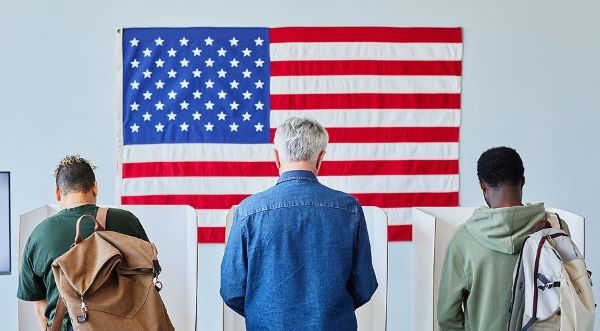Secure, trusted elections are critical to our democracy. Ensuring this security means protecting ballots and voting machines on election day and preventing disinformation leading up to the use of those machines.

AI-powered Disinformation
The biggest threat to election integrity comes in the months and weeks leading up to the election. Social media companies and government entities have been focused on mitigating the ability of foreign powers to disseminate false information online since the 2016 election cycle. But now those bad actors have a powerful new resource at their disposal — Artificial Intelligence (AI).
Creating an Army of Influencers
Widely available generative AI technology makes developing and distributing disinformation easier than ever. Most notably, generative AI makes creating convincing fake online personas easier. With more fraudulent accounts, information can be distributed faster and wider.
An AI-powered personal account on social media can now behave “normally.” Posting about its fake everyday life — photos of dinners out, kids playing in the park, a shopping trip — then every so often a political post. This ability to camouflage the propaganda makes it harder to spot the “bot” accounts. AI makes it incredibly easy to create a multitude of these believable personas — amplifying the political messages they distribute.
Personalized Outreach
AI and machine learning allow legitimate advertisers to reach out to you with information on a closet organizing system you looked up once. It can also feed you new shows you might like after you finish binge-watching Ted Lasso. Now, imagine AI being used to tailor political messages to have the greatest impact on you.
An AI-powered application could generate messages — texts, social media, and email — based on your search and browsing history. Then, using a technique called reinforcement learning, it could generate a succession of messages that become increasingly more likely to change your vote.
The technology exists to make all of these scenarios a reality. With this in mind, legislators and regulators are taking concrete steps to block nefarious applications of AI.
Regulating Human Use of AI
The Federal Election Commission has advanced a petition for rulemaking on the use of deceptive AI-generated content in campaign advertisements. While rules already exist that prohibit and punish those who lie or use doctored images, closing any loophole that AI might fall into has gained support.
Bills have been introduced in both the House and the Senate that cover the use of AI in campaigns. According to a bill introduced by Rep. Yvette Clarke, D-N.Y., much like having candidates state, “I approved this message,” advertisers would have to disclose if they used AI in the production of an ad. A bi-partisan Senate bill, Protect Elections from Deceptive AI Act, similarly aims to identify and ban “deep fakes,” elements which use AI to create images or videos of fake events that depict Federal candidates in political ads.
Securing Day-of Technology
The legislative focus on election security extends to the polls themselves. Another bi-partisian Senate bill, Strengthening Election Cybersecurity to Uphold Respect for Elections through Independent Testing (SECURE), would mandate that systems looking for certification undergo penetration testing to allow researchers to search for vulnerabilities and simulate cyber-attacks.
Even if systems were tested ahead of elections for vulnerabilities, there are many other ways that an election could be disrupted. This summer, the Cybersecurity and Infrastructure Security Agency (CISA) brought together state and local election officials, the FBI, Justice Department, and other agencies to play out the response to hypothetical scenarios that could potentially disrupt election operations. This exercise provided an opportunity to share best practices and additional information about ongoing assessments to identify risks and vulnerabilities to the nation’s voting systems.
Technology advancements hold both promise and peril for the security and integrity of elections. By approaching election security from multiple angles — regulatory, technological, and procedural — the government is working to ensure electoral integrity.
As the founder of GovEvents and GovWhitePapers, Kerry is on a mission to help businesses interact with, evolve, and serve the government. With 25+ years of experience in the information technology and government industries, Kerry drives the overall strategy and oversees operations for both companies. She has also served in executive marketing roles at a number of government IT providers.





Leave a Reply
You must be logged in to post a comment.